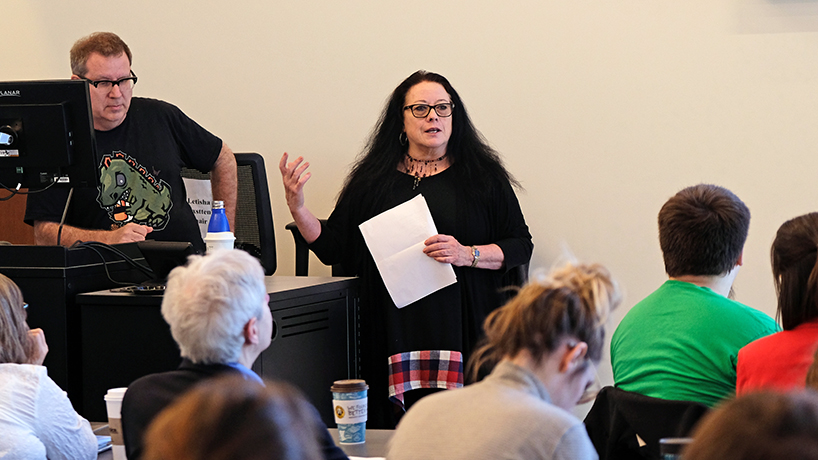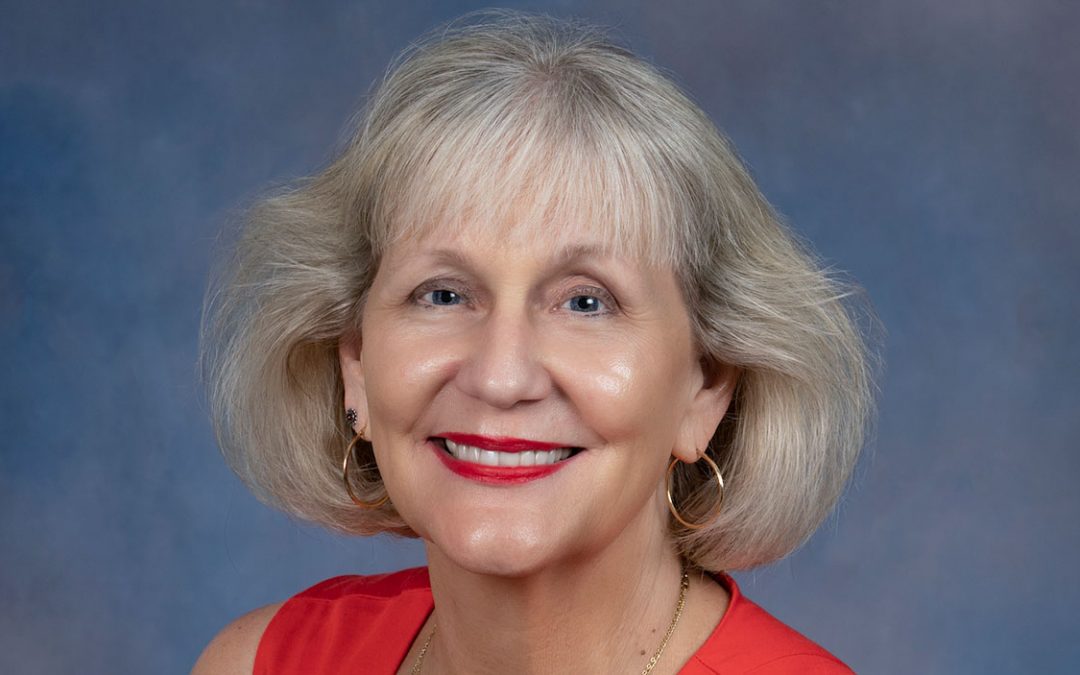
Her peers recently voted Eiichi Shibusawa-Seigo Arai Endowed Professor Laura Miller (center) as president of the Midwest Conference on Asian Affairs. (Photo by August Jennewein)
Laura Miller is certain the two women in the photograph aren’t geisha.
Titled “Geisha Girls” and taken during the 1904 World’s Fair by the Gerhard Sisters, the image resides in the Missouri History Museum’s collection. The image depicts a middle-age woman standing next to a younger, seated woman. Though their expressions are neutral, Miller saw something in the standing woman’s face: maternal tenderness and pride.
The University of Missouri–St. Louis Eiichi Shibusawa-Seigo Arai Endowed Professor of Japanese Studies and professor of history thought so because the seated woman wears an ornate “Uchikake,” a wedding kimono, which is heavily embroidered with plum blossoms and oversized chrysanthemums.
“For me, looking at that as a specialist, it was clear that this was a well-to-do merchant wife and her daughter,” Miller said, explaining she’d attempted to convince the Missouri History Museum to update the photograph’s title. “This idea that all Japanese women are geisha is an old idea. I’m interested is why there is a refusal to get rid of this myth.”
Working to right persistent, historic misconceptions about Japanese women, especially concerning the World’s Fair, is one of Miller’s long-term projects. That venture syncs with her overall personal and professional mission of increasing understanding about Japan. She took big steps toward that goal recently with the release of her book, “Diva Nation: Female Icons from Japanese Cultural History,” and a fresh appointment as president of the Midwest Conference on Asian Affairs.
Miller became interested in Japan during a 1972 post-high school trip. Traveling alone, she’d been stranded and was rescued by strangers. As a result, she’d felt a “moral responsibility to learn the language and culture.” After graduating with her PhD from the University of California, Los Angeles, she was teaching at Loyola University Chicago when UMSL lured her away.
“The endowed professorship is fantastic,” Miller said. “It’s fully supporting my goal of bringing attention to Japan.”
Thanks to her position at UMSL, Miller has been able to organize a variety of symposia featuring top Asian studies scholars. One instructed students on the varied and strong Japanese dialects. Another discussed the overlooked female legends of Japan.
Four years later, that roundtable became Miller’s book “Diva Nation,” which she edited with Rebecca Copeland, professor of Japanese language and literature at Washington University in St. Louis.
“Most of Japanese history from the post-war up until maybe 10 or 15 ago years was written by American men,” Miller said. “They weren’t interested in these earlier women who were queens or founded Kabuki, so they would mention them in a paragraph.”
With the compilation’s 10 jargon-free essays aimed at undergraduate classrooms, Miller intends to change scholarship and thought about both historic and modern Japanese women – even Yoko Ono has a chapter. Miller already is; despite being less than a year old, the book is being used in classrooms.
In Miller’s classroom, students come aware of some Japanese pop culture thanks to its most-known emissaries: “manga” graphic novels and their animated counterpart, “anime.” Both forms are hugely popular in the U.S. as well as in Japan, where the form is so favored that even history has been reimagined for manga.
“It’s been great about getting people in Japan and here interested in Japanese history again,” she said. “But it’s very narrow, these kind of overblown schoolgirl icons in popular culture. Even if they have certain types of power, they are very flat in other ways. We really wanted to show people there’s a huge diversity in women’s roles and women’s importance in Japanese culture and society.”
American fascination springs from a long history with Japan, which comes with a long tradition of writing about Japan, which is then often inflamed by popular culture, such as the film “The Last Samurai,” for better or worse. Furthermore, Miller says, contemporary thinking about Japan, and about Asian studies, has been influenced by ideas such as McWorld or globalization, which posit increasingly similar culture across nations.
“Even McDonald’s has radically changed in Japan,” Miller explained. “It’s not like here at all. To get a sense of what American culture means, you have to go there and actually know the language and the culture.”
One way to give students a well-rounded understanding of the diversity and richness of Asian cultures, Miller believes, is area studies – geographically based interdisciplinary studies. She hopes that her presidency with the MCAA will help her advocate for the discipline at UMSL as well as across all schools in the Midwest.
This won’t be Miller’s first brush with the MCAA. Last year in her role as vice president, she organized four graduate student paper prizes and two undergraduate student paper contests designed to encourage students studying Asia in all academic disciplines. Because many non-coastal schools have small Asian studies programs, with maybe one professor dedicated to a specific country, the MCAA helps provide resources and a network for Asian studies professors.
“I really hope that by taking on this position that I can continually remind administrators that Asian studies is a thing,” Miller said. “It’s a thing in the Midwest.”
Miller feels she’s been able to have a greater effect lately thanks to a department change – she relocated to a joint appointment in history and international studies – as well as support from administrators such as Associate Dean Beth Eckelkamp.
“I am reaching more students now, and that’s my goal,” Miller said. “There’s students from all majors, and they’re just interested in Japan, and so it’s kind of perfect right now. I feel really happy.”














